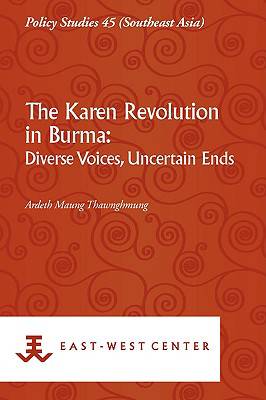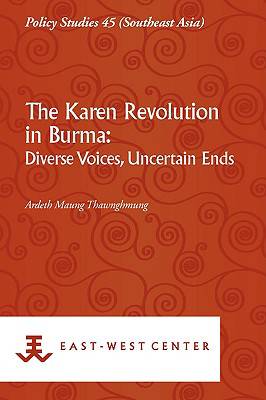
Je cadeautjes zeker op tijd in huis hebben voor de feestdagen? Kom langs in onze winkels en vind het perfecte geschenk!
- Afhalen na 1 uur in een winkel met voorraad
- Gratis thuislevering in België vanaf € 30
- Ruim aanbod met 7 miljoen producten
Je cadeautjes zeker op tijd in huis hebben voor de feestdagen? Kom langs in onze winkels en vind het perfecte geschenk!
- Afhalen na 1 uur in een winkel met voorraad
- Gratis thuislevering in België vanaf € 30
- Ruim aanbod met 7 miljoen producten
Zoeken
The Karen Revolution in Burma
Diverse Voices, Uncertain Ends
Ardeth Maung Thawnghmung
Paperback | Engels
€ 14,95
+ 29 punten
Omschrijving
This study analyses the various types and stages of conflict that have been experienced by diverse groups and generations of Karen over the six decades of armed conflict between the Karen National Union (KNU) and successive Burmese governments. Instead of focusing on those who are internally displaced, those in the refugee camps on the Thai-Burma border or living abroad, or those in the KNU, it places particular emphasis on the "other" Karen, or the majority segment of the Karen population living inside Burma, a population that has hitherto received little scholarly and journalistic attention. It also assesses the Karen people's varied attitudes toward a number of political organizations that claim to represent their interests, toward successive Burmese military regimes, and toward the political issues that led to the original divide between "accommodators" and "rebels." This study argues that the lifestyles and strategies that the Karens have pursued are diverse and not confined to armed resistance. Acknowledging these multiple voices will not only shed light upon the many positive features of ethnic interactions, including harmonious communal relationships and significant attempts to promote peace and stability by encouraging "normal" activities and routines in both peaceful and war-torn areas; it will also help to identify policy recommendations for future ceasefire negotiations and a possible long-term political settlement within the context of a militarized Burma.
Specificaties
Betrokkenen
- Auteur(s):
- Uitgeverij:
Inhoud
- Aantal bladzijden:
- 96
- Taal:
- Engels
Eigenschappen
- Productcode (EAN):
- 9789812308047
- Verschijningsdatum:
- 4/04/2008
- Uitvoering:
- Paperback
- Formaat:
- Trade paperback (VS)
- Afmetingen:
- 152 mm x 229 mm
- Gewicht:
- 149 g

Alleen bij Standaard Boekhandel
+ 29 punten op je klantenkaart van Standaard Boekhandel
Beoordelingen
We publiceren alleen reviews die voldoen aan de voorwaarden voor reviews. Bekijk onze voorwaarden voor reviews.









